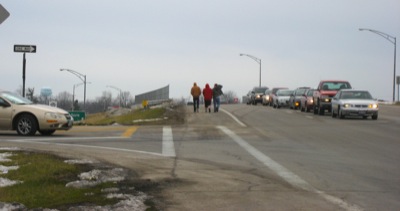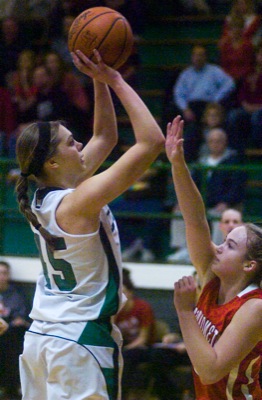Friday, January 11th, 2013
Appraisers debate value loss
By Nancy Allen

Photo by Mark Pummell/The Daily Standard
Appraiser Richard Vannatta testifies Wednesday during a jury trial in Mercer County Common Pleas Court. The trial is to determine how much money the state must compensate a rural Celina couple for damage on their farmland caused by increased flooding from the West Bank spillway on Grand Lake.
A Celina couple and the state disagree on how to calculate how much the state owes them for their flood-damaged land.
Wayne and Janet Doner are among 86 landowners who won a 2011 case in the Ohio Supreme Court that blamed Grand Lake's West Bank spillway, opened in 1997, for causing increased flooding on their farmland. The court's ruling cleared the way for 52 jury trials to determine compensation for landowners.
The Doners have 263 tillable acres of farmland off the north side of Doner Road at Linn Road near the confluence of Beaver Creek and the Wabash River. About 222 of those acres flood. The flooded acres will be recorded as a permanent flowage easement of the state after the trial.
Appraiser Richard Vannatta told jury members in Mercer County Common Pleas Court on Thursday that the state owes the Doners a one-time payment of $2.4 million.
Vannatta, of Columbus, said he determined the payment amount by subtracting the value of the Doner land after the spillway was installed from the value before. He estimated the value of the land has decreased by 90 percent since the spillway opened.
When Vannatta was pressed by the state's attorney Pete DeMarco during cross examination on whether he could produce any objective, unbiased data that would support that 90 percent reduction, Vannatta replied there wasn't any.
"I point to my experience and the fact that the damage is going to continue into infinity," said Vannatta, an appraiser for 40 years. "It's based on my judgement and experience."
Vannatta said he also based the reduced value on cumulative negative effects the flooding has had on the land the last 15 years and the negative effect that recording the permanent flowage easement will have on the land's future value. He said he did not view sale prices for any land that floods to compare to the Doner land.
Appraiser Tom Horner, the state's expert witness, testified that the state only owes the couple $1.36 million.
Horner, of Dublin, said he too determined the payment by subtracting the value of the land after the spillway was installed from the prior value. He told jurors his estimate came from viewing sale amounts for similar properties in Mercer County that flood. He estimates the land's value has been reduced by 55 percent.
Doner's attorney Bruce Ingram asked Horner why he discounted sale prices for flood-prone farmland in the county that sold for much higher prices than the ones he used. Horner said those properties were not comparable because the soils were different from the Doners' and they were located in the livestock-heavy part of the county further south. Farmland in those areas bring higher prices than land near the Doners' which is used mostly for crops, Horner said.
During Wednesday's testimony, the Doners said before the new spillway was built their land flooded one in four years. Their land now floods almost every year, and the flooding is more severe and lasts longer. In 2011 it flooded five times, they said.
Horner agreed the footprint of the previous floodplain on the Doner land is now larger since the spillway opened.
The Doners also testified since the new spillway opened there are many areas on the river bank that have blown out, washing sand, rocks, coolers, traffic signs and other debris onto their farmland. Some of the areas were reinforced with cement only to be washed away again by floodwaters. They have broken farm equipment after hitting debris on their land, they said.
Numerous farm drainage tiles also have broken due to increased water pressure and being clogged with debris, the Doners said. There are about 30 acres they can no longer farm because of the flood damage and blown out areas, the Doners said.
The Doners' case is the first compensation trial to be held among all of the landowners involved in the lawsuit.
The state in 2012 withdrew a blanket settlement offer of $24 million when presented with a counteroffer of about $27 million, which included an additional $3 million for a few business owners and homeowners without farms involved in the case.
The trial is expected to wrap up today with closing arguments and jury deliberation. After the trial and the permanent 222-acre permanent flowage easement is recorded, the Doners will still own and be able to farm the land, and the state will legally be allowed to flood it.





